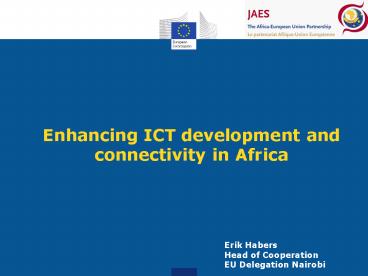Enhancing ICT development and connectivity in Africa - PowerPoint PPT Presentation
Title:
Enhancing ICT development and connectivity in Africa
Description:
Enhancing ICT development and connectivity in Africa Erik Habers Head of Cooperation EU Delegation Nairobi Background ICT are proven drivers of innovation for ... – PowerPoint PPT presentation
Number of Views:158
Avg rating:3.0/5.0
Title: Enhancing ICT development and connectivity in Africa
1
Enhancing ICT development and connectivity in
Africa
Erik Habers Head of Cooperation EU Delegation
Nairobi
2
Background
- ICT are proven drivers of innovation for
sustainable development, since - They allow for a rapid and free flow of
information, increasing economic efficiency,
ensuring decisions - They offer solutions to employment, health,
education, protection, environment, governance,
commerce... - A 10 increase in internet access has been shown
to lead to an 1.2 increase in several countries
GDP
MDG 8 'In cooperation with the private sector,
make available benefits of new technologies,
especially information and communications' (Plus
indirect effect in MDGs 2, 4, 5 and 6)
3
Challenges
- Growing Digital Divide
- Great disparity among countries
- Access limited in many parts of Africa
- Main reasons
- Low collaboration South-South
- Intra-African communications often routed through
Europe - High prices
- Little competition
- Lack of political and economic stability and
coherent policies hampering private investments
4
EU Response Strategy
- Enhance the bilateral policy dialogue
- Assist to the development of an inclusive
information society in Africa - Focus on preparing the enabling environment
(regulation, interconnections) for private
sector investments - (ICT is not a focal sector in EU development
policy, but a cross-cutting modality with
applications in several other sectors)
5
EU priorities for ICT development in Africa
- 1. Harmonisation and alignment of
e-communications policies and regulations with EU
framework - 2. Enabling the transition from analogue to
digital broadcasting and the regulation of the
Digital Dividend - 3. Establishment and interconnection of research
and education networks and connection to the
European network GÉANT - 4. Enhancement of ICT capacity building (for ALL,
i.e. citizens, governments, private sector etc.)
6
Priority 1 Harmonisation and aligment of
e-communications policies and
regulations in
developing countries with EU framework
- Objective Improved regulations promoting
fairness, transparency, human rights and freedom
of expression - Result A fair and transparent enabling
environment, improving ICT access for citizens,
business and organisations
7
Priority 2 Enabling the transition from analogue
to digital broadcasting in Africa and the
regulation of the Digital Dividend.
- Objective Creation a new huge market of online
applications and services contributing in this
way to inclusive growth, employment and
sustainable development in Africa - Results Development/convergence of relevant
policies and regulations in domains defining the
digital dividend regulation/management challenge,
like radio spectrum policy and management,
cross-border radio frequency management, digital
media/broadcasting policy, broadband policy etc.
8
Priority 3 Establishment and interconnection of
research and education networks and connection to
European network GÉANT
- Objective Increase in research cooperation and
regional computing capacity, generate scientific
excellence, bridge the digital divide, reduce
'brain drain', contribute to economic and social
well-being - Results Strenghtening of cooperation between
research communities. Provide capacity to meet
high-volume needs of other not-for-profit
sectors. Influence the development of a telecom
market and regulatory environment reducing the
costs and enabling cross-border traffic
9
Example AfricaConnect project
- Establishes a high capacity internet network for
research and education in Southern and Eastern
Africa - Improves connectivity and collaboration within
the region and with the rest of the world through
the interconnection with the pan-European
research network GÉANT - Contributes to the development of education and
research in Sub-Saharan Africa
10
Priority 4 Enhancement of ICT capacity building
(for ALL, citizens,
governments, private sector etc.)
- Objective To reduce the digital divide, through
a better understanding of the new technologies,
the roll-out of broadband, the deployment of
efficient ICT systems adapted to local needs and
the promotion of free and open access to the
internet - Results Roll-out of broadband connectivity,
deployment of efficient and resilient ICT systems
and promotion of free and open access to the
internet
11
Increasing engagement
- Scaling-up of ongoing initiatives
- Exploiting synergies between the EU Digital
Agenda and the AU ICT development frameworks - Fostering deployment of innovative e-services to
enhance interconnections
12
- THANK YOU
- for
- Your Attention!

